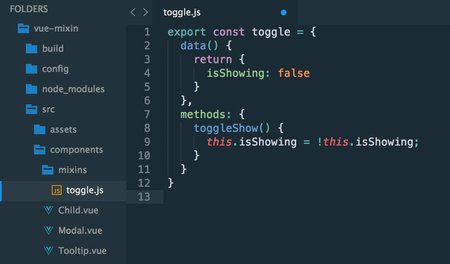Vue 之 Mixins (混入)
Mixins
Mixins是一种分发Vue组件中可复用功能的很是灵活的一种方式。

何时使用
Mixins
1. 页面的风格不用,可是执行的方法和须要的数据相似,咱们是选择每一个都写呢仍是提取出公共部分呢?
基础实例vue
咱们有一对不一样的组件,它们的做用是切换一个状态布尔值,一个模态框和一个提示框。这些提示框和模态框除了在功能上,没有其余共同点:它们看起来不同,用法不同,可是逻辑同样。
// 模态框
const Modal = {
template: '#modal',
data() {
return {
isShowing: false
}
},
methods: {
toggleShow() {
this.isShowing = !this.isShowing;
}
},
components: {
appChild: Child
}
}
// 提示框
const Tooltip = {
template: '#tooltip',
data() {
return {
isShowing: false
}
},
methods: {
toggleShow() {
this.isShowing = !this.isShowing;
}
},
components: {
appChild: Child
}
}
解决办法以下:
const toggle = {
data () {
isshowing: false
},
methods: {
toggleShow() {
this.isshowing = !this.isshowing
}
}
}
// 下面便可使用了
// mixins: [变量名]
const Modal = {
template: '#modal',
mixins: [toggle],
components: {
appChild: Child
}
};
const Tooltip = {
template: '#tooltip',
mixins: [toggle],
components: {
appChild: Child
}
};
若是你是以vue-cli建立的项目来写,能够这样
// mixin.js
export const toggle = {
data () {
isshowing: false
},
methods: {
toggleShow() {
this.isshowing = !this.isshowing
}
}
}
// modal.vue
// 将mixin引入该组件,就能够直接使用 toggleShow() 了
import {mixin} from '../mixin.js'
export default {
mixins: [mixin],
mounted () {
}
}
// tooltip组件同上
合并vuex
当组件和混入对象含有同名选项时,这些选项将以恰当的方式混合。vue-cli
1、数据对象内
mixin的数据对象和组件的数据发生冲突时以组件数据优先。数组
var mixin = {
data: function () {
return {
message: 'hello',
foo: 'abc'
}
}
}
new Vue({
mixins: [mixin],
data: function () {
return {
message: 'goodbye',
bar: 'def'
}
},
created: function () {
console.log(this.$data)
// => { message: "goodbye", foo: "abc", bar: "def" }
}
})
2、钩子函数
同名钩子函数将会混合为一个数组,都将被调用到,可是混入对象的钩子将在组件自身钩子以前调用。app
var mixin = {
created: function () {
console.log('混入对象的钩子被调用')
}
}
new Vue({
mixins: [mixin],
created: function () {
console.log('组件钩子被调用')
}
})
// => "混入对象的钩子被调用"
// => "组件钩子被调用"
3、值为对象的选项
值为对象的选项,例如 methods, components 和 directives,将被混合为同一个对象。两个对象键名冲突时,取组件对象的键值对。ssh
var mixin = {
methods: {
foo: function () {
console.log('foo')
},
conflicting: function () {
console.log('from mixin')
}
}
}
var vm = new Vue({
mixins: [mixin],
methods: {
bar: function () {
console.log('bar')
},
conflicting: function () {
console.log('from self')
}
}
})
vm.foo() // => "foo"
vm.bar() // => "bar"
vm.conflicting() // => "from self"
全局混入函数
全局混合被注册到了每一个单一组件上。所以,它们的使用场景极其有限而且要很是的当心。一个我能想到的用途就是它像一个插件,你须要赋予它访问全部东西的权限。但即便在这种状况下,我也对你正在作的保持警戒,尤为是你在应用中扩展的函数,可能对你来讲是不可知的。this
Vue.mixin({
mounted() {
console.log("我是mixin");
}
})
new Vue({
...
})
再次提醒,当心使用它!那个 console.log将会出如今每一个组件上。这种状况还不算坏(除了控制台上有多余的输出),但若是它被错误的使用,你将能看到它会多么的有害。spa
一个使用合理的例子
// 为自定义的选项 'myOption' 注入一个处理器。
Vue.mixin({
created: function () {
var myOption = this.$options.myOption
if (myOption) {
console.log(myOption)
}
}
})
new Vue({
myOption: 'hello!'
})
// => "hello!"
总结插件
混合对于封装一小段想要复用的代码来说是有用的。对你来讲它们固然不是惟一可行的。混合很好,它不须要传递状态,可是这种模式固然也可能会被滥用。因此咱们仍是须要仔细斟酌使用喽!!
例子
import {mapGetters} from 'vuex'
// 目的是想要处理 scroll 的bottom值,在含有playlist列表的状况下
export const playlistMixin = {
computed: {
...mapGetters([
'playList'
])
},
mounted() {
this.handlePlaylist(this.playList)
},
activated() {
this.handlePlaylist(this.playList)
},
watch: {
playlist(newVal) {
this.handlePlaylist(newVal)
}
},
methods: {
// 若是组件中没有这个方法,那么就报错
handlePlaylist() {
throw new Error('component must implement handlePlaylist method')
}
}
}
相关文章
- 1. Vue 3 mixins 混入
- 2. vue混入(mixins)的应用
- 3. vue的mixins混入功能
- 4. Vue对象中的混入对象mixins
- 5. Vue 之 Mixins
- 6. Vue混入(mixins)理解及应用
- 7. vue中mixins(混入)的使用
- 8. vue-mixins
- 9. vue------vue中mixins(混入)的使用方法和注意点
- 10. stylus之混合书写(Mixins)
- 更多相关文章...
- • XSD 混合内容 - XML Schema 教程
- • SQLite 注入 - SQLite教程
- • YAML 入门教程
- • 互联网组织的未来:剖析GitHub员工的任性之源
相关标签/搜索
每日一句
-
每一个你不满意的现在,都有一个你没有努力的曾经。
欢迎关注本站公众号,获取更多信息

相关文章